Nicaragua. One big prison.
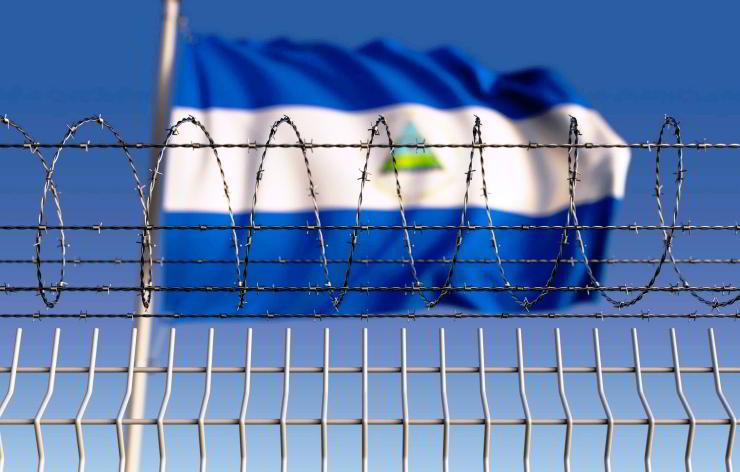
Seven years have passed since the protests against the regime. Assassinations, desaparecidos, incarcerations and deportations have marked the life of this country during those years. The Ortega-Murillo dictatorship continues its repressive action undaunted.
At the entrance to the habitation of Niquinohomo, a small village not far from Masaya, stands the statue of General Augusto César Sandino, a national hero. As I look at it carefully, an old man approaches, struggling to walk, and he says: “I fought in the northern jungle against Somoza, proud to be a Sandinista. On that day, July 19, 1979, I entered Managua with my rifle on my shoulder. Years of struggle. I saw so many of my young friends die for freedom. And now, 46 years later, what is left? Another dictatorship.” And he continues: “Sandinism no longer exists, Orteguism (from the name of the co-president Ortega) exists, but also Murilloism (from the co-president Murillo). A woman who has never fought. She doesn’t know what it means to fight and believe in freedom. And yet, she got herself elected co-president. I can’t imagine another ascent to power like this anywhere else in the world.”
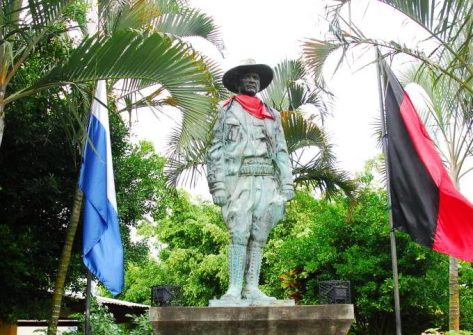
The statue of General Augusto César Sandino in Niquinohomo. “Sandinism no longer exists”. File swm
He rolls his eyes and stares at the statue of Sandino, shaking his head. “I think of my grandchildren who had to flee to Costa Rica after the riots of 2018 and another grandchild of mine who went to live in the United States. They are the ones who enable me to live. Every month they send me money so I can eat. I don’t know if I’ll see them again. These grandchildren of mine fought because they believed in democracy and freedom, like their grandfather. When they were little, I told them about my battles in the jungle. Now we live in a regime that imprisons, kills and destroys the lives of so many Nicaraguans.” He stops, breathes heavily, turns and slowly shuffles away with his walking stick.
April 2018
For years, the country had been experiencing considerable social tension due to the excessive centralisation of power, blatant corruption at the top of government and the constant erosion of democratic spaces. But the straw that broke the camel’s back was the decision to reform the Nicaraguan Social Security Institute (INSS).
On April 18, 2018, some pensioners took to the streets to protest against the reform and were attacked by supporters of the Ortega government. This episode unleashed a wave of indignation that inflamed spirits, especially in universities. That same night, the student mobilisation began, which became the centre of the civic insurrection. Between April 19, 20, and 21, the capital Managua and other cities in the country, such as León, became the scene of unprecedented repression. The riot police, supported by paramilitaries, opened fire at chest height with the aim of killing. The young people defended themselves by putting up barricades. To defend themselves, they threw stones and fell riddled by the bullets of the police and paramilitaries.
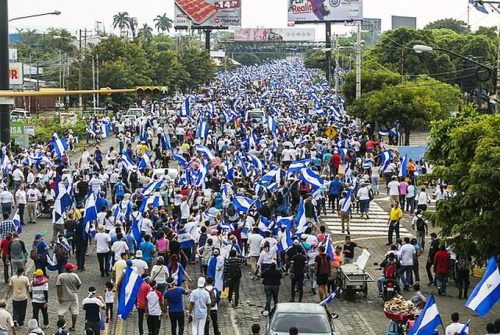
Crowd fills the street at a protest in May 2018. CC BY-SA 2.0 /Jorge Mejía Peralta
One of them was fifteen-year-old Álvaro Manuel Conrado Dávila (Alvarito), who died after being hit in the throat by a bullet. Alvarito was a high school student who on the morning of April 20, decided to give his support to the students of the Universidad Nacional de Ingeniería (Uni), who were expressing their dissent against those who were taking away their future. Too young to be on the front lines of the clash, he was in charge of bringing water to the older ones who were facing the police charges.Just as he was trying to bring some water, he was suddenly hit by a bullet from a sniper stationed in the Denis Martínez National Stadium. “It hurts to breathe,” he managed to say before being taken to the medical tent and then transported by volunteers to the Croce Azzurra hospital in the capital. But Alvarito was not allowed to pass through the hospital medical centre. The order that reached the country’s public health facilities from the then health minister of Daniel Ortega’s regime, Sonia Castro, was clear and peremptory: no medical attention was to be given to the protesters.
Thus, amid general dismay and anger, Alvarito was taken to another private hospital, Bautista, where, after a desperate attempt to save him with a 4-hour surgical operation, he was declared dead. He had lost too much blood, doctors said: if he had received immediate medical attention, he could have been saved. The violent repression continued.
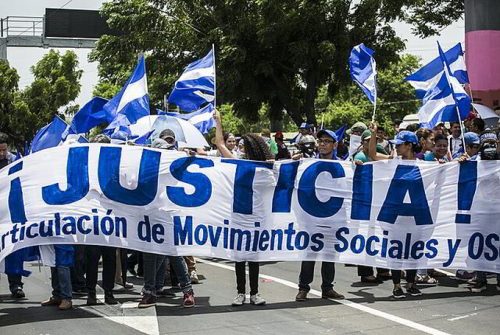
Demonstrations and protests in Masaya against Ortega government. CC BY-SA 2.0 /Jorge Mejía Peralta
After the events of April, a system of repression and terror was inaugurated aimed at dismantling and nipping in the bud any possible opposition to the regime. The “cleanup operation”, launched in July of the same year by Ortega, aimed to eliminate the barricades in the main cities. Hundreds of arbitrary imprisonments followed, as well as the persecution of those who had participated in the protests. Civil and democratic liberties were suspended, preventing free movement and the right to demonstrate and limiting the constitutional rights of the population. Finally, the final was attack against NGOs and the press.
On September 24, 2018, the Nicaraguan Association for Human Rights (ANPDH) was already speaking of 1,300 desaparecidos, 512 dead and over 4,000 injured.
Panic and Fear
Since 2018, at least 800,000 Nicaraguans, 11.8% of the estimated 6.8 million inhabitants, have been forced to leave the country. This is the “largest exodus in the history” of the country.
“Panic and fear,” says a political analyst who prefers to remain anonymous for fear of repression by the regime. “We live in a condition of generalized illegality. People are being charged with crimes that were never committed or that should not be considered as such. More than 40 methods of torture are practised in Nicaraguan prisons and prisoners are subjected to cruel, inhuman and degrading treatment: they are subjected to violence, they are not given food and they do not have access to sunlight.” And he continues: “In the country, there is total control of social networks. There is a law, the “Ley de Ciberdelitos”, through which the dictatorship can imprison you on a discretionary basis: for example, if a person posts a blue and white flag and writes “Viva Nicaragua”, this can be identified as a crime. People are now afraid even to take part in WhatsApp groups: the fear has increased with the new reform of the law, which came into force last September.”
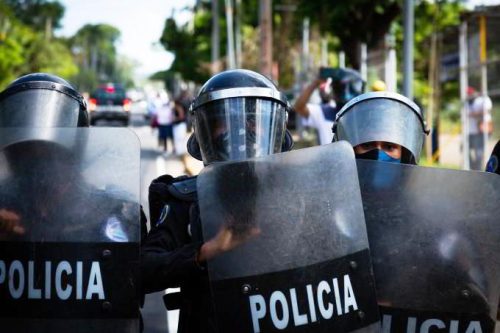
The riot police fired at chest height, intending to kill. Shutterstock/Jeiner Huete_P
Ortega-Murillo strength lies in repression with the help of the police and the army. According to Javier Meléndez, an analyst of Defence and Security, “the relationship between the military leadership and the Ortega regime began as a political pact, in which the army was given the green light to develop its own business, without entering politics. Ortega undoubtedly depends on the army to be in power and the institution is so compromised in terms of human rights violations, corruption and commercial economic operations that both need each other to survive.”
On February 21, 2025, General Julio César Avilés, Commander in Chief of the Army, was sworn in for the fourth consecutive term.
The analyst continues: “The participation of the army in the repression, through the supply of weapons of war to pro-government gangs, which has caused hundreds of deaths, imprisonments, disappearances and thousands of injured, and the refusal of the military hierarchies to disarm the paramilitary gangs as requested by jurists and civil society organisations, puts in doubt the very survival of the institution on the day that an acceptable form of rule of law is restored.”
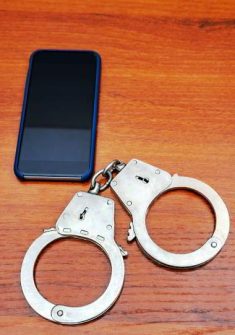
In the country, there is total control of social networks. 123rf
With a new law, the Daniele Ortega – Rosario Murillo “Volunteer Police” was created, composed of civilians, as an “auxiliary and support body” to the security forces. For poet Gioconda Belli, who was forced into exile in Spain and stripped of her Nicaraguan nationality, it is “a repressive and lawless army that has been given constitutional status.” The fact that these “Volunteer Police” wear balaclavas, a practice previously reserved for special units, is generating controversy, as many fear that anonymity gives them a “license to commit crimes.” Last February 17, Police Inspector General Jaime Vanegas revealed that there are more than 50,000 sworn paramilitaries across the country.
Since 2022, more than six hundred people have been deported and stripped of their citizenship. Not only that but their assets have been seized by the regime.
A report by Monitoreo Azul y Blando details that, between January 2024 and February 2025, at least 349 Nicaraguans have been victims of “migratory repression” by the Ortega regime. Actions against these citizens include exile, refusal to renew passports, and prohibition from leaving or entering Nicaragua.
Last February 26, a new report by the UN Group of Experts on Human Rights accused the Nicaraguan government of dismantling the last remaining checks on its power and systematically implementing a strategy to consolidate total control over the country through serious human rights violations.
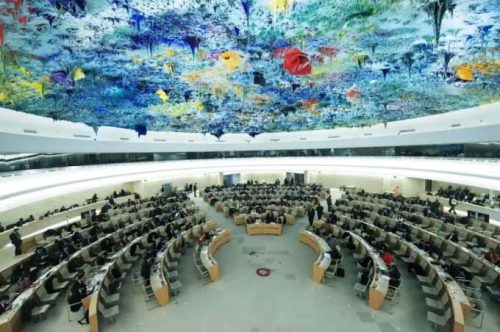
A view of a session at the UN Human Rights Council. Nicaragua withdraws from the UN Human Rights Council. Photo: UN
The experts found that the regime of President Daniel Ortega and Rosario Murillo has deliberately transformed the country into an authoritarian state in which independent institutions have disappeared, opposition voices have been silenced and the population – both inside and outside Nicaragua – has been subjected to persecution, forced exile and economic reprisals. The experts called for decisive international action to address these violations.
President Daniel Ortega’s government announced its withdrawal from the UN Human Rights Council after the UN report. Co-President and First Lady Rosario Murillo called the decision “sovereign and irrevocable”. They said Nicaragua would cease participation in all activities related to the Human Rights Council and its “satellite mechanisms”.
Seven years have passed and resignation and desperation are apparent among the people we met. An uncertain future. Every family in Nicaragua has a child or a parent who has had to flee due to repression. Silence is mandatory. (Open Photo: Flag of Nicaragua.123rf)
N.A.R.



